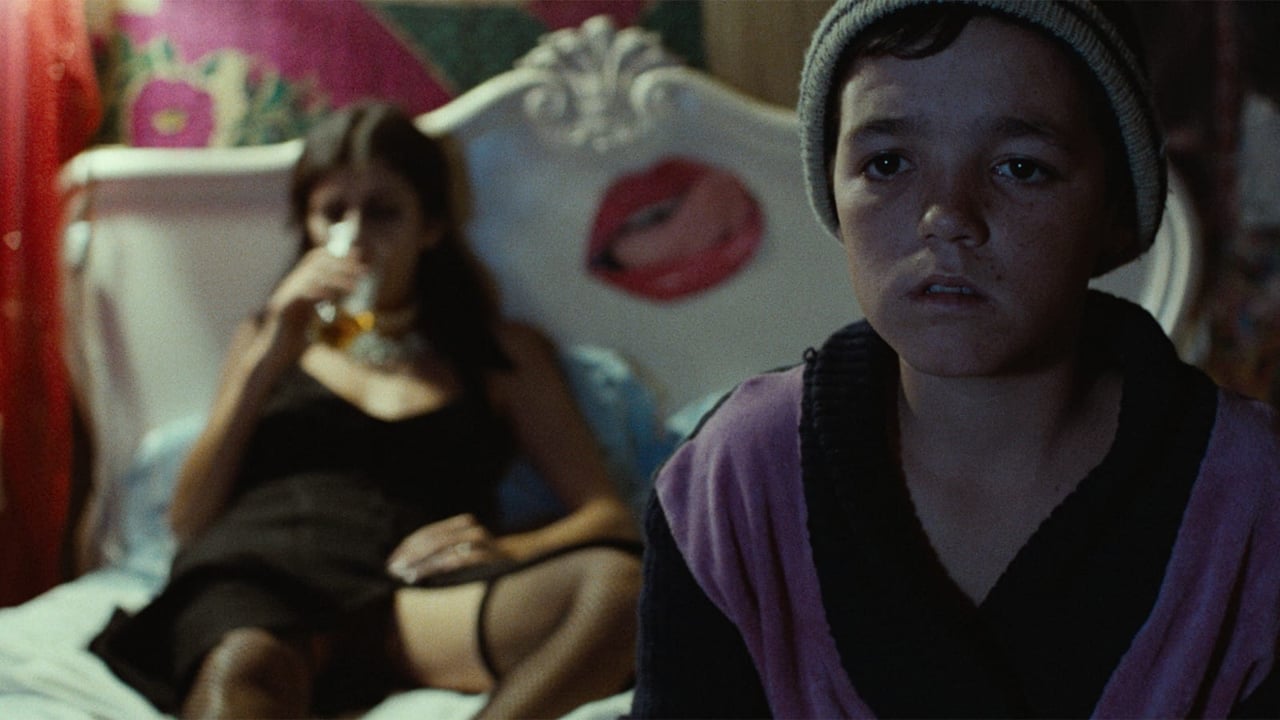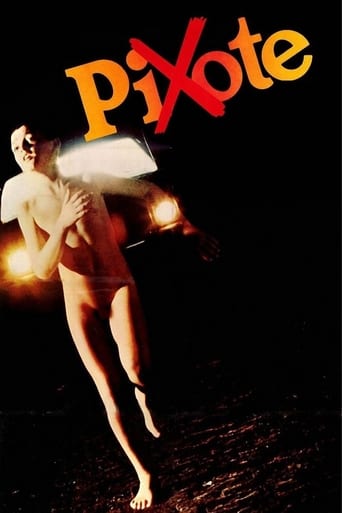



Stylish but barely mediocre overall
It's funny watching the elements come together in this complicated scam. On one hand, the set-up isn't quite as complex as it seems, but there's an easy sense of fun in every exchange.
View MoreGood films always raise compelling questions, whether the format is fiction or documentary fact.
View MoreThere are moments that feel comical, some horrific, and some downright inspiring but the tonal shifts hardly matter as the end results come to a film that's perfect for this time.
View MoreAt the time of Pixote's production in 1980-1981, over half of the cast of "City Of God" wasn't even an idea or even a twinkle in their father's eyes. Over two decades before the release of Fernando Meirelles' ultra-violent crime saga depicting feral youth growing up too fast in Rio, "Pixote: A Lei do Mais Fraco" set the bar as high as Christ the Redeemer overlooks the city in terms of capturing an accurate reality of the brutal favela life. This hyper-realist, Oliver Twist-by-way-of-Larry Clark account of wayward Brazilian youth still by today's standards provides stark, grim and shocking imagery. Regardless of the generational gap, what truly separates "Pixote" from "City of God" is that it didn't need to use highly stylized violence to compel the viewer. It relied more on the realism and hopelessness of the characters, the blunt sexuality, and a much more punctual yet effective treatment on street violence and state power. In the beginning of the film, (and not every version may feature this) director Hector Babenco (who went on to direct some mainstream American films such as "Kiss of The Spider Woman" and "Ironweed") makes a brief fourth wall breaking announcement of his intentions to depict the daily life of a child in the urban landscape of Sao Paolo. Within this prologue, he reveals the lead protagonist, Fernando Ramos da Silva as himself in his natural habitat.As the child on child violence in City of God seems sensational, when one of these children in Pixote does commit a heinous act, you see the innocence being chipped away frame by frame. Unlike the murderous, maniacal Lil Ze from Ciudad de Deus - who seems to attribute his penchant for crime to something inexplicably innate and evil inside him - Pixote and his cohorts start off as confused, troubled innocent kids who escape their prison-like orphanage and enter the crime world out of survival. In other words, Pixote strives to capture the root causes of youth delinquency, and puts it into a much more constructive context. As far as structure, Pixote is very much like Full Metal Jacket (although it came out five years before, I'm aware). It's split into two parts. The first is the children's experiences in a youth detention center, where they witness and unsuccessfully dodge sexual assault and corruption. This first act could serve as the basic training, complete with the vulnerabilities, the bonding and the resistance soon to follow as seen in Full Metal Jacket. Once a brave select group manages to escape after one of their fellow boarders mysteriously disappears, the four adolescents flee to Rio De Janeiro. Act two is the struggle and eventual dissolution of the four youngsters as they experience complications from drug trafficking, pickpocketing and prostitution in Rio, which offers some beautiful and gritty establishing shots of the city at night. These sequences are parallel to the urban warfare, sniper-dodging chaotic second act of Full Metal Jacket. There is one particular moving scene on the beach when the youngsters share their aspirations within their delusions of freedom and future success. It's just so inspiring yet depressing to see how much hope these kids still have after everything they have gone through. And their situations only gets worse. What makes Pixote even more ahead of its time is how it treats the theme of sexual identity so sensitively. In an incredibly powerful performance, Jorge Juliao, who portrays the gender dysphoric Lilica provides depth to the character. Lilica takes on a maternal role towards Pixote, as she is several years elder than the titular protagonist. This film demonstrates the ability of humans to overcome their differences in the name of survival and trust. There is genuinely a familial bond between the characters, but their dynamics are not restricted. In a time and place where LGBT representations in media would have been taboo, Lilica brings about a character that is far more multi-dimensional than anything US cinema has attempted to do up to that point. Juliao manages to balance the nurturing with the self destructive aspects of her character without slipping into the "hysterical gay" stereotype. Last but not least, the second half also displays the development of the runaways' relationship with Sueli, an aging yet destructively young at heart sex worker, brilliantly portrayed by Marilia Pera. The climax unravels as these kids move in with Sueli. They take on a pimp role and subsequently use her to bait clients that they can rob. As criminal amateurs, they must deal with their own priorities and their complex emotions come into play as they each search for a role within Sueli that she may not be able to provide for them due to her own insecurities. While it is certainly fair to debate if this is art or exploitation, in short, we could conclude that Pixote: A Lei do Mais Fraco, is provocative and disturbing but necessary and politically resonant. When Larry Clark's "Kids" was released in 1995, it was critically summed up by Janet Maslin as "a wake up call to the modern world." Well if Kids was a wake-up call, then Pixote was the equivalent of your car alarm going off in the middle of the night...and it's parked a block away.
View More'Pixote' is a hard watch - even by todays standards and desensitization culture it comes across as shocking. It's brutal, yes, but this is not a violent film. Perhaps the shock arises from the realization that stories like Pixote's are happening around the world every day, as sometimes the most horrific scenarios are uncovered by simply turning the cameras on ourselves. The plot loosely revolves around a child, Pixote, who fights to survive in the Favelas (I'm hesitant to use the term 'fight to survive' because of the pitying imagery it conjures, however, it fits - we've never seen a child fight as hard as Pixote) and through him we are given a glimpse into a world that thankfully few of us see; crime, drugs, prostitution, police brutality and murder are just a few of the iniquities that Pixote is forced to reckon with each day. Not since maybe Elem Klimov's Come and See has a young protagonist been exposed to so much tragedy. It is the only world he knows and he takes it on with a look that implies detachment and wisdom beyond any adult in the film. Shot with minimal crew in a raw, documentary style, 'Pixote' throbs with a vibrant seediness (the only way I can describe it), and contains some of the bravest performances ever put to film. Now - if only it were made available for people to see.
View MoreI liked the movie. At the beginning it started as documentary as some guy was talking about the tough conditions in Brazil. What actually impressed me was that as the guy mentioned all the kid actors including the main character Pixote played by Fernando Ramos Da Silva were coming from the real world from the poorest neighborhoods, with one mission in life to survive.Drugs, rape, prostitution, murder Pixote has seen them all, and after reading the biography of the actor I am inclined to think that he has seen this things much before the idea of crating of that movie came up. You could actually sense that in his acting.Not only the horrors of the street life are shown, the cruelty of the police and people who are in theory responsible for people for problems which have found themselves arrested for some stupid crime do they deserve to die for it ?!? Any why does no one cares but instead the police and the director of the brostel in which Pixote is taken are trying to cover everything up to avoid any responsibility, blaming everything upon the people they are supposed to help. In the movie when a boy asked his mother to take him out of the place where he was locked up she said " what could happen to you here " only she didn't know and he did not want to tell her to describe the dimensions of the hell surrounding him invisible to the outside world but existing. And I have to tell you that this is just as things are in the real life but no one cares...
View MoreThis is probably the best movie from director Hector Babenco. It shows a Brazilian reality unknown by foreigners, which is the same reality that haunts all of the Latin American countries, poverty and a survival instinct. The most affected in this reality is the children usually left orphans, or abandoned by their poor parents have to make it in a "dog eat dog" society many times falling into the gap of delinquency, prostitution and crime. Very well acted and with a "no frills" approach, this movie will get to you, Great story plot, a must have movie on anybody's collection. The starring role went to Fernando Ramos da Silva, a young boy who fell into the crime wave, killed some years later during a robbery. I would suggest people to watch the movie "Who killed Pixote?" so you can have a more in depth idea of the lives of these characters. Some other Characters from the movie had a similar fate, some died and others are in jail. None the less this movie will last for a long time in your memory
View More